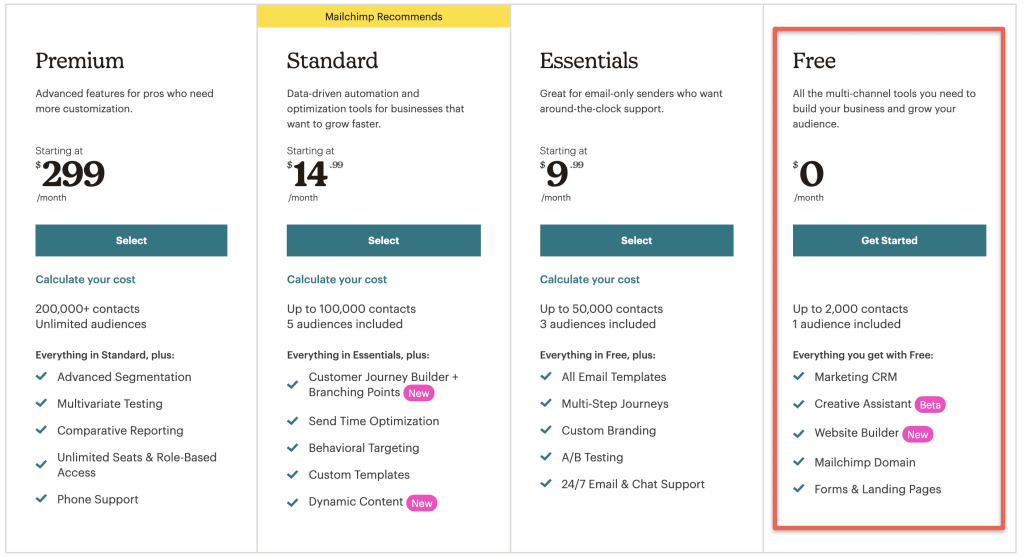Aweber vs mailchimp comparison
AWeber offers competitive pricing plans that cater to businesses of all sizes. This article is about comparison in between Aweber vs mailchimp.They provide a free plan for up to 500 subscribers, which is ideal for small businesses and beginners. Paid plans are reasonably priced and unlock advanced features, making them suitable for scaling your email marketing efforts as your business grows.
AWeber is a top-notch email marketing platform that outshines its competitors for several reasons. Its user-friendly interface, robust feature set, exceptional deliverability rates, excellent customer support, and affordability make it a preferred choice among marketers and businesses.
While there are other email marketing platforms on the market, AWeber’s combination of accessibility and advanced capabilities makes it a standout option for those seeking an effective, reliable, and budget-friendly solution for their email marketing needs. To find out if AWeber is the right fit for your business, consider exploring their free plan and experience firsthand how it can elevate your email marketing campaigns.
Aweber vs. Mailchimp: Choosing the Right Email Marketing Platform
In the dynamic world of digital marketing, selecting the right email marketing platform is crucial for the success of your campaigns. Aweber and Mailchimp are two prominent players in the field, each offering unique features that cater to different business needs. In this comprehensive comparison, we’ll delve into the key aspects of both platforms to help you make an informed decision.
1. User-Friendly Interface:
Aweber:
Aweber boasts an intuitive and user-friendly interface, making it easy for beginners to navigate through various features. The drag-and-drop editor simplifies the email creation process, allowing users to craft visually appealing campaigns without technical expertise.
Mailchimp:
Mailchimp is renowned for its sleek and user-centric design. Its dashboard is easy to navigate, and the platform offers a comprehensive set of tools. The drag-and-drop builder, similar to Aweber’s, facilitates the creation of visually stunning emails.
Verdict: Both platforms score well in terms of user-friendliness, making them suitable for users with varying levels of experience.
2. Email Automation:
Aweber:
Aweber provides robust automation features, allowing users to set up automated email sequences based on subscriber behavior. This is particularly beneficial for lead nurturing and targeted marketing.

Mailchimp:
Mailchimp excels in automation capabilities, offering advanced workflows that include tagging, segmentation, and personalized content delivery. The platform’s AI-driven Predicted Demographics feature further enhances the effectiveness of automated campaigns.
Verdict: Mailchimp edges ahead with more advanced automation features.
3. Integration and Compatibility:
Aweber:
Aweber integrates seamlessly with a variety of third-party tools, including popular CRMs and e-commerce platforms. While the list of integrations is extensive, it may not be as extensive as Mailchimp’s.Get best offer on aweber.
Mailchimp:
Mailchimp stands out for its extensive integration options. It integrates with a wide array of apps and platforms, providing users with flexibility and scalability as their business grows.
Verdict: Mailchimp takes the lead in terms of integration capabilities.
4. Pricing:
Aweber:
Aweber offers a straightforward pricing model based on the number of subscribers. It provides a free plan with limited features and a 30-day free trial for its premium plans.
Mailchimp:
Mailchimp also follows a subscriber-based pricing model, but it offers a free plan with more features than Aweber’s free version. The paid plans are competitive, and users can choose based on their specific needs.
Verdict: The choice between Aweber and Mailchimp depends on your budget and the features you require.
5. Customer Support:
Aweber:
Aweber provides excellent customer support through email, live chat, and phone. The support team is known for its responsiveness and helpfulness.
Mailchimp:
Mailchimp offers a knowledge base, email support, and live chat. However, phone support is limited to certain plans. The knowledge base is comprehensive and can assist users in troubleshooting common issues.
Verdict: Aweber and Mailchimp both offer reliable customer support, with Aweber having an edge in terms of phone support.
In conclusion, the choice between Aweber and Mailchimp ultimately depends on your specific needs and preferences. Aweber is an excellent choice for beginners and those seeking simplicity, while Mailchimp caters to users looking for advanced features and scalability. Consider your budget, desired features, and long-term goals when making your decision.
6. Analytics and Reporting:
Aweber:
Aweber provides essential analytics tools, including open rates, click-through rates, and subscriber growth. While the analytics are comprehensive, they might not be as advanced as Mailchimp’s.
Mailchimp:
Mailchimp offers robust analytics and reporting features, allowing users to track the performance of their campaigns in detail. It provides insights into subscriber engagement, social media performance, and e-commerce data.
Verdict: For in-depth analytics, Mailchimp is the preferred choice.
7. Templates and Design Flexibility:
Aweber:
Aweber offers a range of professionally designed templates that are customizable to fit your brand. The drag-and-drop editor makes it easy to create visually appealing emails.
Mailchimp:
Mailchimp is renowned for its extensive template library. The platform provides a high level of design flexibility, enabling users to create visually stunning emails. Its design capabilities are especially beneficial for businesses with a strong emphasis on branding.
Verdict: Mailchimp excels in design flexibility and template variety.

8. Deliverability:
Aweber:
Aweber has a strong reputation for high deliverability rates. The platform employs industry best practices to ensure that your emails reach your subscribers’ inboxes.
Mailchimp:
Mailchimp also boasts excellent deliverability, aided by its strong anti-spam measures and proactive monitoring.
Verdict: Both platforms are reliable in terms of email deliverability.
9. Security Features:
Aweber:
Aweber prioritizes the security of user data and communications. It employs encryption and follows industry standards to protect sensitive information.
Mailchimp:
Mailchimp adheres to robust security protocols, ensuring the confidentiality and integrity of user data. It provides features like two-factor authentication for added security.
Verdict: Aweber and Mailchimp are both committed to ensuring the security of user data.
Choosing between Aweber and Mailchimp requires a careful consideration of your specific business needs, budget, and future growth plans. Aweber is an excellent choice for those who prioritize simplicity and ease of use, while Mailchimp appeals to users looking for advanced features, extensive integrations, and scalability.
In summary, Aweber is a solid option for small to medium-sized businesses with straightforward email marketing needs, while Mailchimp is a versatile platform suitable for businesses of all sizes, particularly those with a focus on advanced automation and analytics.
Before making a decision, take advantage of the free trials offered by both platforms to explore their features and see which aligns better with your goals. Ultimately, the right choice will depend on your unique requirements and preferences in the realm of email marketing.
10. Mobile Responsiveness:
Aweber:
Aweber ensures that emails created on its platform are mobile-responsive, allowing your campaigns to display effectively on a variety of devices. This is essential considering the increasing prevalence of mobile email consumption.
Mailchimp:
Mailchimp also prioritizes mobile responsiveness, providing templates and tools that adapt well to different screen sizes. This is crucial for reaching audiences who access their emails primarily on smartphones and tablets.
Verdict: Both platforms prioritize mobile responsiveness, ensuring a seamless user experience across devices.
11. Community and Education Resources:
Aweber:
Aweber offers educational resources such as blog posts, webinars, and guides to help users enhance their email marketing skills. The Aweber community provides a platform for users to share insights and tips.
Mailchimp:
Mailchimp is known for its extensive knowledge base, offering tutorials, guides, and a community forum. Additionally, Mailchimp regularly produces content such as podcasts and webinars to keep users informed about the latest trends and best practices.
Verdict: Both platforms provide valuable educational resources, with Mailchimp having a slight edge in terms of the breadth of its knowledge base.
12. A/B Testing Capabilities:
Aweber:
Aweber allows users to conduct A/B testing on subject lines and email content, enabling optimization based on subscriber preferences. This feature is valuable for refining your email marketing strategy.
Mailchimp:
Mailchimp offers robust A/B testing features, allowing users to experiment with different variables, including content, send times, and more. The results can inform data-driven decisions for future campaigns.
Verdict: Mailchimp offers more advanced A/B testing options, making it preferable for users who prioritize extensive experimentation.
13. API and Developer-Friendly Features:
Aweber:
Aweber provides a RESTful API, enabling developers to integrate Aweber’s functionality into other applications. While it may not have as many features as Mailchimp in this regard, it caters to basic integration needs.
Mailchimp:
Mailchimp’s API is robust and well-documented, making it suitable for developers looking to customize and extend the platform’s functionality. The extensive API capabilities contribute to Mailchimp’s reputation as a developer-friendly platform.
Verdict: Mailchimp is the preferred choice for users with advanced integration and customization requirements.
In the Aweber vs. Mailchimp battle, both platforms have strengths and weaknesses. Aweber is a solid choice for simplicity and ease of use, particularly for those just getting started with email marketing. On the other hand, Mailchimp is a versatile platform that excels in advanced features, extensive integrations, and scalability.
Before making a decision, evaluate your specific needs, consider your budget, and assess the long-term scalability of each platform. Both Aweber and Mailchimp offer trial periods, providing an opportunity for hands-on exploration to determine which aligns better with your business goals. Remember, the right choice ultimately depends on your unique requirements and preferences in the realm of email marketing.






